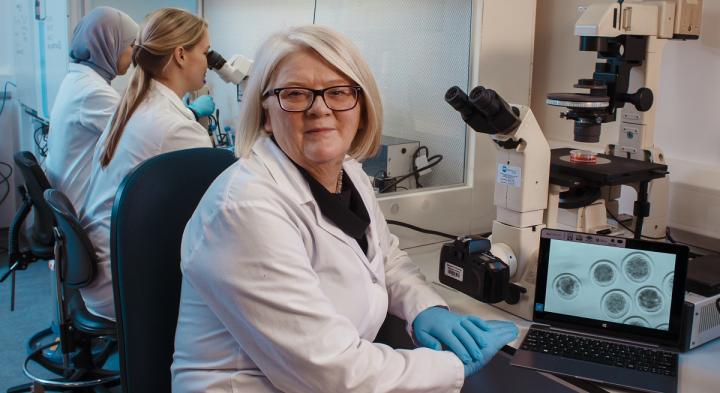Paving the way for new fertility treatments
Edinburgh scientists made headlines around the world in 2018 by growing egg cells to maturity outside the human body for the first time.

The growth of human eggs in the laboratory by researchers at the University aims to support the development of pioneering therapies for women. The team was able to mature the eggs, which had been taken from women’s ovary tissue at their earliest stage of development, to the point at which they could potentially be fertilised.
Professor Evelyn Telfer in the School of Biological Sciences led the work, which builds on 30 years of research. It could enable procedures to safeguard the fertility of girls with cancer ahead of potentially harmful treatment, such as chemotherapy, by maturing and storing their eggs for later fertilisation.
Making a difference through donors
Studying human eggs requires live tissue, which can only be obtained from donors having treatment for related conditions. For this study, the research was possible thanks to donations of tissue from women having routine surgery.
Professor Telfer and her team work closely with medical experts in child cancer and fertility preservation, which allows them to approach potential donors. Specialist nurses work on behalf of the team to explain the research and offer support to prospective donors and their families.
As well as girls and young women with cancer, tissue is donated by women undergoing caesarean births, and transgender patients. Patients who are having tissue removed for preservation as part of their treatment may agree to give a small amount for research.
“Girls with cancer who have not yet reached puberty are offered fertility preservation in cases where clinicians think there is a good chance of survival,” explains Professor Telfer.
“Parents appreciate that when they are offered this, it’s a good sign, and often they choose to also support our research.”
Transgender patients may choose to donate their ovaries following surgery as Professor Telfer explains: “All the transgender patients we have approached have agreed to donate their tissue – and for any eggs developed from that tissue to be fertilised, if we are able to take research to that stage. This has gifted us tissue from a range of ages, which is really valuable. We have an incredible team working with patients, and it is a very supportive environment.”
A strong reputation in reproductive research
The breakthrough is the latest in a history of reproduction science achievements at Edinburgh. In the late 1980s, Professor Telfer was in one of the first groups at Edinburgh to grow mouse eggs in the lab. When she set up her own lab in Edinburgh in 1992, she began working on other species including pigs, sheep and cows, to further her understanding of ovarian development.
Later collaborations, including with Professor Sir Ian Wilmut, famed for his cloning work, led Professor Telfer to further her investigations. “The University has fostered really good conditions for scientists and clinicians to collaborate,” she says.
In the latest study, she worked with her established small team and clinical colleagues at Edinburgh alongside long-time collaborator Professor David Albertini at the Center for Human Reproduction in New York.
The University has fostered really good conditions for scientists and clinicians to collaborate.
Scientists and medical experts worked together to develop substances – known as culture mediums – and carefully controlled conditions that would support each stage of egg cell development. The study lends insight into how eggs develop, which could aid research into other infertility treatments and regenerative medicine.
Professor Telfer’s team is now working to improve the quality of eggs in the lab by optimising their growth conditions. By testing and improving these – such as the delivery of nutrients and oxygen – they aim to give eggs the best chance of making healthy embryos.
The team is also seeking regulatory approval to fertilise eggs. This would allow the use of an in vitro fertilisation technique – injecting a single sperm into an egg – to see whether lab-grown eggs are fertile. By law, embryos obtained this way can be maintained for several days, affording an opportunity to study them.
As a limited amount of human tissue is available, the team continues complementary work in animal species – mainly using cow tissue, which shares some characteristics with human ovaries. Work is also carried out with other species, including mole rats and elephants. “With each animal we study, we always learn something, so we cast our net wide,” says Professor Telfer.
Her team is also working in stem cells, which can form any kind of tissue in the body. Working out how these can become ovarian cells could have rich potential for generating eggs without ovarian tissue.
International recognition
Following the team’s latest achievement, Professor Telfer was nominated for an international award, as one of Porter magazine’s Incredible Women of 2018. She was named alongside other women who have inspired by their actions – including the actor Meryl Streep, presenter Oprah Winfrey, and former first lady Michelle Obama.
As Professor Telfer’s research moves closer to the point where it may help patients, she looks forward to seeing this delivered by clinical experts: “Our scientific work is very focused, but it becomes real when we engage with the public. When I hear people’s stories, it can feel very emotional. Most women – although not all – hope to have children and I feel for those who cannot – they are very vulnerable.”
“We do not want to be peddlers of false hope,” she continues. “A balanced approach is needed in communicating our results. However, the feedback we have is overwhelmingly positive. We hope that we can contribute to making a difference for people with fertility issues.”
Video
Professor Evelyn Telfer discusses her research.

